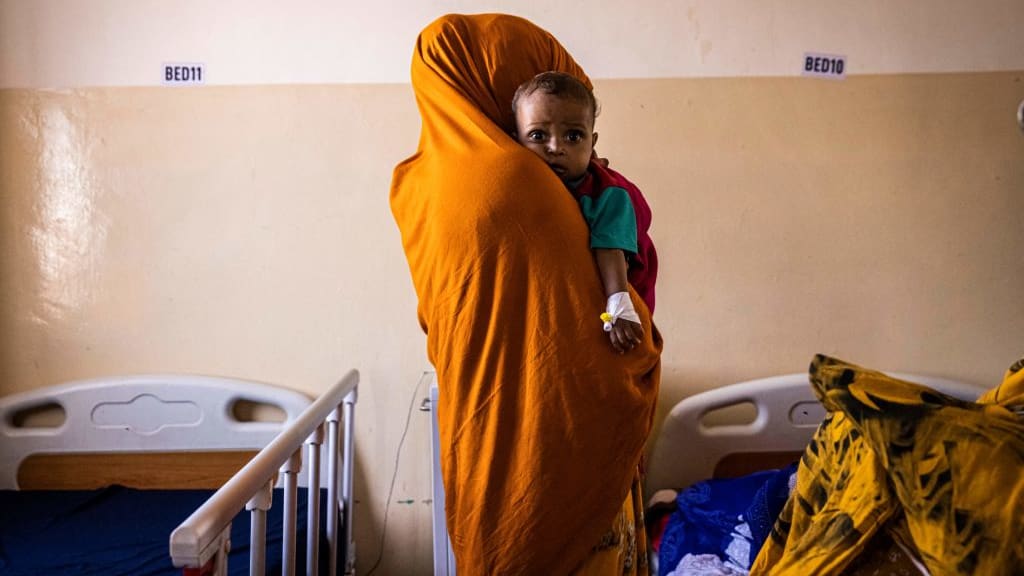Aid workers say children in Somalia are dying of starvation 'before our eyes'


A free daily email with the biggest news stories of the day – and the best features from TheWeek.com
You are now subscribed
Your newsletter sign-up was successful
Somalia is experiencing its worst drought in 40 years, and a World Food Program official says famine is imminent for millions of people unless there is a "massive" and immediate increase in humanitarian relief and funding for the country.
"We need money and we need it now," Michael Dunford, the World Food Program's regional director for east Africa, told G7 leaders meeting this week in Germany. If there isn't a "massive scaling-up from right now," Dunford continued, it won't be possible to avoid a catastrophic famine in Somalia, where children are dying of starvation "before our eyes."
The last four rainy seasons have been dry in Somalia and surrounding countries, and because of the drought, the World Food Program said 89 million people in east Africa are considered "acutely food insecure." A recent report from the Integrated Food Security Phase Classification initiative found that at least 213,000 people are expected to face famine by September.
The Week
Escape your echo chamber. Get the facts behind the news, plus analysis from multiple perspectives.

Sign up for The Week's Free Newsletters
From our morning news briefing to a weekly Good News Newsletter, get the best of The Week delivered directly to your inbox.
From our morning news briefing to a weekly Good News Newsletter, get the best of The Week delivered directly to your inbox.
Claire Sanford, deputy humanitarian director for Save the Children, told The Guardian that while visiting Somalia, she met several mothers who have buried multiple children this year due to malnutrition. "I can honestly say in my 23 years of responding to humanitarian crisis, this is by the far the worst I've seen, particularly in terms of the level of impact on children," she said. "The starvation that my colleagues and I witnessed in Somalia has escalated even faster than we feared."
A famine in 2011 killed more than 250,000 people in Somalia, most of them children, and Sanford said people are telling her that today's conditions are even worse. "We have genuinely failed as an international community that we have allowed the situation to get to the extent it is at the moment," Sanford said. After asking for money earlier in the year, by April, the United Nations had received just 3 percent of the funds it asked for to go to Somalia, Ethiopia, and South Sudan, The Guardian reports.
A free daily email with the biggest news stories of the day – and the best features from TheWeek.com
Catherine Garcia has worked as a senior writer at The Week since 2014. Her writing and reporting have appeared in Entertainment Weekly, The New York Times, Wirecutter, NBC News and "The Book of Jezebel," among others. She's a graduate of the University of Redlands and the Columbia University Graduate School of Journalism.
-
 What are the best investments for beginners?
What are the best investments for beginners?The Explainer Stocks and ETFs and bonds, oh my
-
 What to know before filing your own taxes for the first time
What to know before filing your own taxes for the first timethe explainer Tackle this financial milestone with confidence
-
 The biggest box office flops of the 21st century
The biggest box office flops of the 21st centuryin depth Unnecessary remakes and turgid, expensive CGI-fests highlight this list of these most notorious box-office losers
-
 Key Bangladesh election returns old guard to power
Key Bangladesh election returns old guard to powerSpeed Read The Bangladesh Nationalist Party claimed a decisive victory
-
 Epstein files topple law CEO, roil UK government
Epstein files topple law CEO, roil UK governmentSpeed Read Peter Mandelson, Britain’s former ambassador to the US, is caught up in the scandal
-
 Iran and US prepare to meet after skirmishes
Iran and US prepare to meet after skirmishesSpeed Read The incident comes amid heightened tensions in the Middle East
-
 EU and India clinch trade pact amid US tariff war
EU and India clinch trade pact amid US tariff warSpeed Read The agreement will slash tariffs on most goods over the next decade
-
 Israel retrieves final hostage’s body from Gaza
Israel retrieves final hostage’s body from GazaSpeed Read The 24-year-old police officer was killed during the initial Hamas attack
-
 China’s Xi targets top general in growing purge
China’s Xi targets top general in growing purgeSpeed Read Zhang Youxia is being investigated over ‘grave violations’ of the law
-
 Panama and Canada are negotiating over a crucial copper mine
Panama and Canada are negotiating over a crucial copper mineIn the Spotlight Panama is set to make a final decision on the mine this summer
-
 Why Greenland’s natural resources are nearly impossible to mine
Why Greenland’s natural resources are nearly impossible to mineThe Explainer The country’s natural landscape makes the task extremely difficult
